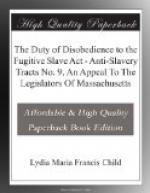Alas! in an unlucky hour, your tipsy master-brother sees your gentle Amy, and becomes enamored of her large dark eyes, and the rich golden tint of her complexion. Your earnings and your ransom-money make him flush of cash. In spite of all your efforts to prevent it, she becomes his property. He threatens to cowhide you, if you ever speak to her again. You remind him that she is your wife; that you were married by a minister. “Married, you damned nigger!” he exclaims; “what does a slave’s marriage amount to? If you give me any more of your insolence, you’ll get a taste of the cowhide.”
Anxious days and desolate nights pass. There is such a heavy pain at your heart, it is a mystery to yourself that you do not die. At last, Amy contrives to meet you, pale and wretched as yourself. She has a mournful story to tell of degrading propositions, and terrible threats. She promises to love you always, and be faithful to you till death, come what may. Poor Amy! When she said that, she did not realize how powerless is the slave, in the hands of an unprincipled master. Your interview was watched, and while you were sobbing in each other’s arms, you were seized and ordered to receive a hundred lashes. While you are lying in jail, stiff with your wounds, your master-brother comes to tell you he has sold you to a trader from Arkansas. You remind him of the receipt he has given you for six hundred dollars, and ask him to return the money. He laughs in your face, and tells you his receipt is worth no more than so much brown paper; that no contracts with a slave are binding. He coolly adds, “Besides, it has taken all my spare money to buy Amy.” Perhaps you would have killed him in that moment of desperation, even with the certainty of being burnt to cinders for the deed, but you are too horribly wounded by the lash to be able to spring upon him. In that helpless condition, you are manacled and carried off by the slave-trader. Never again will Amy’s gentle eyes look into yours. What she suffers you will never know. She is suddenly wrenched from your youth, as your mother was from your childhood. The pall of silence falls over all her future. She cannot read or write; and the post-office was not instituted for slaves.
Looking back on that dark period of desolation and despair, you marvel how you lived through it. But the nature of youth is elastic. You have learned that law offers colored men nothing but its penalties; that white men engross all its protection; still you are tempted to make another bargain for your freedom. Your new master seems easy and good-natured, and you trust he will prove more honorable than your brother has been. Perhaps he would; but unfortunately, he is fond of cards; and when you have paid him two hundred dollars, he stakes them, and you also, at the gaming-table, and loses. The winner is a hard man, noted for severity to his slaves. Now you resolve to take the risk of running




